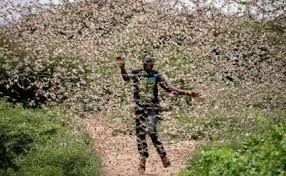
Global Politics
UGANDA: LOCUST EXPERT SAYS UGANDA A TIME BOMB IS COMING ON FOOD SECURITY AS LOCUST BREED IN KENYA, SUDAN AND SOMALI.
EXPERT WARNS OF CATASTROPHE FOLLOWING LOCUST INVASION IN UGANDA
.
Locusts Native to Australia, occurring primarily in inland breeding areas including parts of Queensland, New South Wales, South Australia and Western Australia. Adults are identifiable by a black spot on the tip of the hind wing. Outbreaks occur in some seasons when dense swarms of adult locusts can invade pastoral and cropping areas of southern Australia. Up-to-date advice can be obtained from the Australia.
Ministry of Agriculture, Animals Industry and Fisheries trained 100 extensions Agricultural Officers and District Agricultural Officer how to combat Locust in Gulu.
Dr. John W. Banana Locust Expert and Consultant Ministry of Agriculture, Animal Industry and Fisheries say the current locus was breaded in Australia, and later flied 4,000 kilometer to Mauritania West Africa.
GULU-UGANDA: Dr. John W. Banana Locust Expert warns Ugandans to be alert to face locust invasion in three or six months, as Kenya failed to combat the invasion. When swarms of locusts present were reported in Kenya, Uganda was ill prepared to combat the swarms until when it entered the country from Amudat district on Feb. 9, 2020.
Dr. Banana reasons that although the Country is facing Desert Locust invitation, the current swarms of locusts is not a threat because the life cycle of mature locusts is the one that Kenya is currently experiencing.
“I have been a consultant on Locusts for 17 years even when the war was in Mozambique during the PRELIMO, I also fought Locusts in Namibia, Ethiopia, and Somali during the war. Now, I am still fighting Locusts in Uganda Karamoja, but the difference is that we used school children about 16 years whom we trained as advance team to direct Helicopters, they stay one kilometer away to where the chopper was spraying swarms of locusts.”
Dr. Banana wonders why Ugandans are worried that the locust invasion is the end of the world, Ugandans say it is God that sent the locusts.
The country worries that when God sent Locusts to Pharaoh it swept every thing, now people say it the end of the world, yet this is not true.
He argues that it not total disaster, “don’t say we are finished.” We shall fight them because the plug, for now we are now preparing you to be ready when the swarms of locusts enter Uganda after 6 months, the matter of disaster and population threat is there when the locusts clear the crops; there will be food relief from WFO. Locusts are a deadly killer because it will eat all the crops and insects and will kill us to.”
Dr. Banana says the record of Desert Locust forces indicates that it originated from Sahara desert, Mauritania, Egypt, Yemen, Somali and West Africa.
He adds on that the current Locust invasion was reported in mid August 2019, and they have been updating the world about the locust invasion on the Desert Locust website for the last two years.
The danger of locusts
What worries Ugandans is the chemical being sprayed against the locusts because they cannot be sprayed with insecticide. Even the UPDF soldiers who are spraying the locusts, their lives are at risk, the animals grazing ground water where swarms is present when the chemical is spray the impact are so devastating.
He adds on that when they hired people from Western Uganda those who have been spraying locust from morning till evening without eating anything, when they went back, they died. Because when spraying the swarms they were not eating any food, remember they were inhaling the chemicals they were spraying.
Wilfred A. Opio ,a Locust Expert from Uganda National Agricultural Organization also admitted that the dangerous side effects of the Chemical on the future of bees.
He says so far, they have received UGX 50 million in addition to UGX 15 million which was released earlier by the Ministry of Agriculture, Animals Industry and Fisheries.
Thus, every day since swarms of locust entered the country from Karamoja, the locust fighters have been using UGX 3 million per day, and yet Kenya claimed that they are using KGX 1 million per day, that is politically.
Uganda scientist’s paradox on locust
James Okoko, the Amuru district Agricultural Extension officer expects that the role of controlling and combating locusts be integrated into UPDF programs.
Geoffrey Kinyera, the Extension Agricultural officer for Nwoya district says he wants to know where the locusts breed from, and how they can be controlled.
Nok Rach, from Lamwo district says he would like to know how to use and pick the GPS coordinates when locusts attacked the areas.
Bwoch Steven, an Agricultural Extension Officer who did not introduce himself says his major problem is how he can coordinate the fight against swarms with the district.
“He wonders if the Ministry has capacity to deal with the locust.” Bwoch argued.
Richard Olanya, an Agricultural Extension officer from Parabongo, Agago district says his expects to get more information about locusts. He also questions if the locusts have been sent into the country by God to punish us just like he did to punish Pharoah in the bible.
Omony P’Mao expects to see samples of the locusts while Omony Alfred from Kitgum expects to learn how locusts breed.
Amony Stella, the Gulu Agricultural Extension officer is interested in reporting about the swarms, while Peter Sserwanga from FAO says expects to learn the behavior of the locusts in addition to knowing the different grouping of locusts.
Cankara Emma Obonyo and Komakech Simon Peter expect to get updates from the workshop.
Betty Jokene expects to be equipped with skills on how to spray the swarms, while Angela Anena from Nwoya says wants to know how the locusts can be used as animal and chicken feeds and what are the impacts of the chemoical being used to spray on organisms.
Jesse Johnson Muto expects to know the different locust from the experts view.
Expert from Agriculture Ministry
John Lutunyakol Assistant Commissioner Ministry of Agriculture explained that since the locust invasion in Karamoja Sub Region early last month, he has never slept in his house and on a daily basis he is receiving more than 100 phone calls.
“I think you are here for the purpose and fundamentally Uganda expects you to play roles and responsibilities to do quality control and this is your mandate.”
He concluded that as Entomology they know it is a time bomb coming onto food security in Uganda.
He argued the Agricultural officers who have been trained on how to contain the locust swarms once they invade the district.
The Commissioner appeals to teams that have been trained on how to use the GPS coordinate, to send information regarding locusts from parts of Northern Uganda.
The latest report on locust invasion indicates that the swarms have entered Eastern DR. Congo, Soroti district which is a threat, Western Uganda, and to places likes Bunyoro, Busoga, and Buganda Sub Region are also prone to locust attacks.





